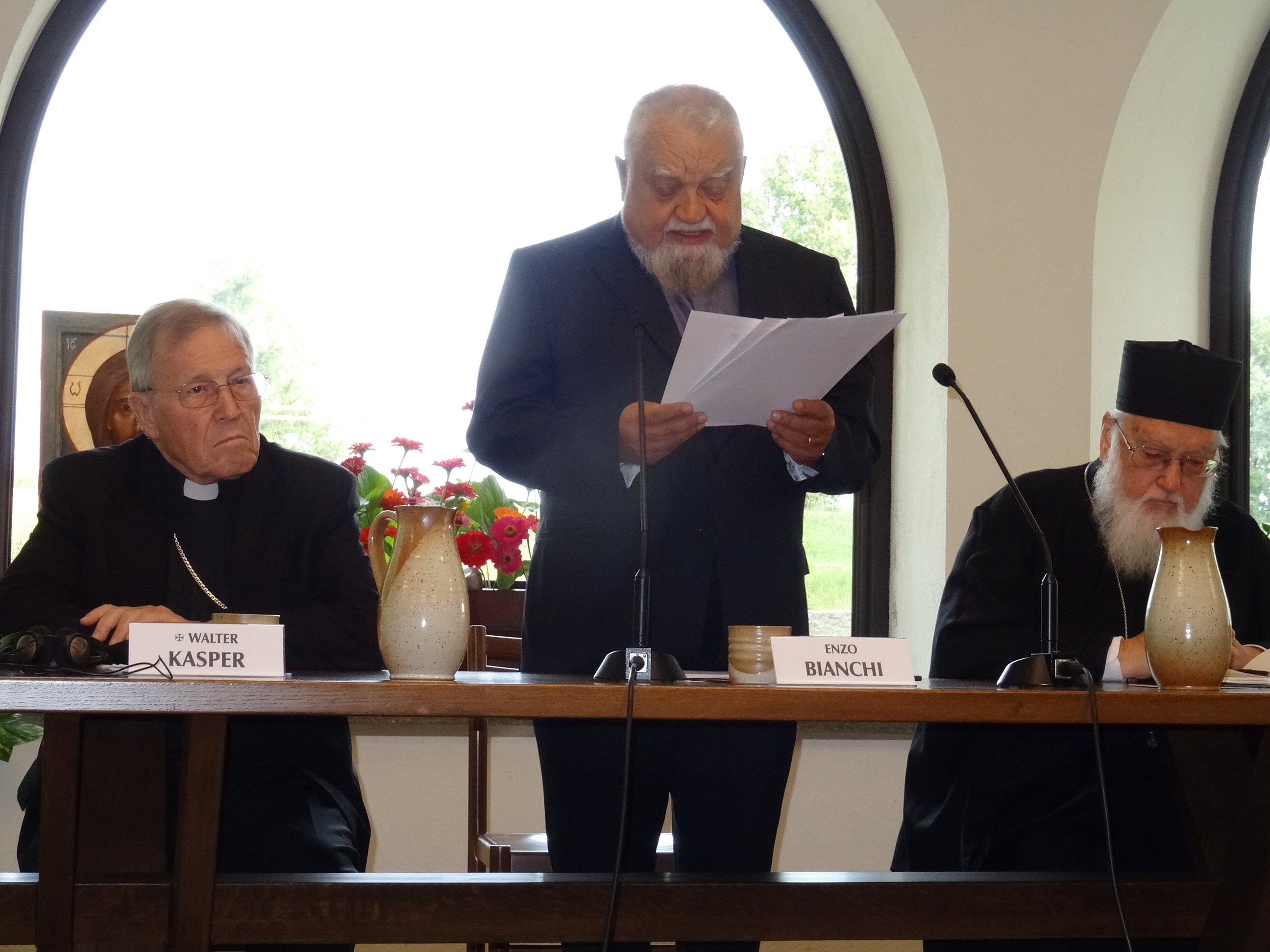Featured image: Enzo Bianchi with Metropolitan Kallistos of Diokleia and Walter Cardinal Kasper, 2015, by Jim Forest.
ENZO BIANCHI’s article “Perche il Papa non è filorusso” (“Why the Pope is not pro-Russian”) in La Repubblica (11 September 2023) is a betrayal of Catholic solidarity toward a suffering Church and people.
There are several problems with his comments:
Bianchi misjudges the controversy which arose from complaints by Ukrainians (and also Russians and others) about the Pope’s laudatory words of certain historical Russian rulers, in his remarks to Russian youth. It is not a question of the Pope, as universal father of Christians, choosing one people over another, as Bianchi suggests. The difficulty arose from the Pontiff praising historical models which modern, revanchist Russia uses to defend its genocidal war against Ukraine. Francis himself later admitted that his remarks, although well intended, were poorly chosen.
Bizarrely, Bianchi uses apprehensions about the papal remarks to attack the Ukrainian Greek-Catholic Church (UGCC), whose bishops have been pursued by death squads, whose priests are persecuted, abused, imprisoned and tortured by an illegal invasion of a revanchist empire. Its intelligentsia have been sentenced to death, its faithful also are being bombed, raped, murdered, racially and ecclesially negated, deprived of the basic human freedoms which Mr Bianchi stills defends, in other contexts.
Like many people who are ignorant of the basics of the subject, Bianchi confuses “Uniates” (Eastern Catholics) with so-called “Uniatism.” According to the Balamand Declaration of 1990, Uniatism is a spent model of Church unity whereby Catholics proselytise Orthodox.
The problem with Bianchi’s argument is that, in reality, the UGCC is not a proselytising denomination. At the Second Vatican Council (1962–1965), it made a commitment not to proselytise but rather to seek church unity via ecumenical relations and irenic outreach. Its relations with Orthodox Christians are well defined in Vatican II‘s decrees Ecclesiarum Orientalium and Unitatis redintegratio, and in its Particular Law and theology. UGCC believes that belonging to one or another denomination is determined by the free will and conscience of an individual.
On the other hand, in Ukrainian territory occupied by revanchist Russia, Catholics and Orthodox Christians are imprisoned, abused, tortured, have their churches destroyed, and their freedom to worship denied. In free Ukraine, all Churches and religions have the right to exist and to worship.
Bianchi pretends that the issue is about only Greek-Catholics but in Ukraine, Roman Catholic (RC), Orthodox Churches, Jews, Muslims, etc. have also asked for solidarity and for the condemnation of the invasion of Ukraine. RC bishops in Ukraine have also cried out to their fellow Catholics for solidity and support. Bianchi seems to ignore this and even to refuse such solidarity.
The Russian authoritarian regime has pointed the finger at UGCC for supporting Ukrainian civil society, which Russia considers to be political and anti-Russian. In reality, the UGCC stands with its faithful and supports justice, peace, freedom, and rejects criminality and fraud, especially when engineered by the FSB (KGB) via its lackeys and useful idiots.
Since the beginning of the war in Ukraine (2014), many Orthodox Christians, formerly under Moscow, joined the Orthodox Church of Ukraine (OCU) under the Ecumenical Patriarch. This has nothing to do with “Uniatism” except in the minds of Russian imperialists. For centuries, Russian society has seen papist plots under every stone and, for them, Ukrainian Orthodox autocephaly (which has nothing to do with Russia or Catholics) is also a Vatican conspiracy.
Contrarian agendas played out within Catholicism only weaken the Church’s voice outside its walls. Catholics cannot claim to practice ecumenism toward other Christians when they refuse to do so among themselves.

